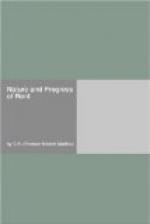In treating of productive and unproductive labour in the last volume, he observes,(4) that, ’The net surplus by which the Economists estimate the utility of agriculture, plainly arises from the high price of its produce, which, however advantageous to the landlord who receives it, is surely no advantage to the consumer who pays it. Were the produce of agriculture to be sold for a lower price, the same net surplus would not remain, after defraying the expenses of cultivation; but agriculture would be still equally productive to the general stock; and the only difference would be, that as the landlord was formerly enriched by the high price, at the expense of the community, the community would now profit by the low price at the expense of the landlord. The high price in which the rent or net surplus originates, while it enriches the landlord who has the produce of agriculture to sell, diminishes in the same proportion the wealth of those who are its purchasers; and on this account it is quite inaccurate to consider the landlord’s rent as a clear addition to the national wealth.’ In other parts of his work he uses the same, or even stronger language, and in a note on the subject of taxes, he speaks of the high price of the produce of land as advantageous to those who receive it, it but proportionably injurious to those who pay it. ‘In this view,’ he adds, ’it can form no general addition to the stock of the community, as the net surplus in question is nothing more than a revenue transferred from one class to another, and from the mere circumstance of its thus changing hands, it is clear that no fund can arise out of which to pay taxes. The revenue which pays for the produce of land exists already in the hands of those who purchase that produce; and, if the price of subsistence were lower, it would still remain in their hands, where it would be just as available for taxation, as when by a higher price it is transferred to the landed proprietor.’(5)
That there are some circumstances connected with rent, which have an affinity to a natural monopoly, will he readily allowed. The extent of the earth itself is limited, and cannot be enlarged by human demand. And the inequality of soils occasions, even at an early period of society a comparative scarcity of the best lands; and so far is undoubtedly one of the causes of rent properly so called. On this account, perhaps, the term partial monopoly might be fairly applicable. But the scarcity of land, thus implied, is by no means alone sufficient to produce the effects observed. And a more accurate investigation of the subject will show us how essentially different the high price of raw produce is, both in its nature and origin, and the laws by which it is governed, from the high price of a common monopoly.
The causes of the high price of raw produce may be stated to be three.
First, and mainly, that quality of the earth, by which it can be made to yield a greater portion of the necessaries of life than is required for the maintenance of the persons employed on the land.




